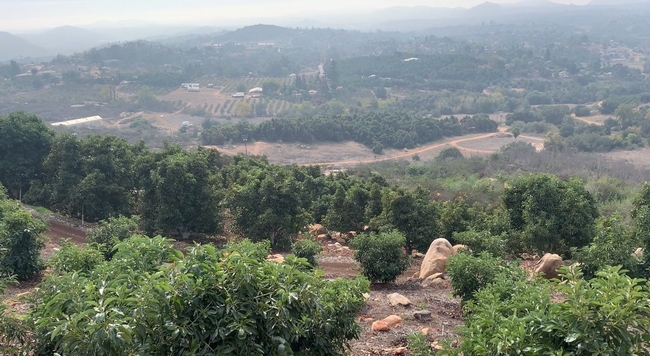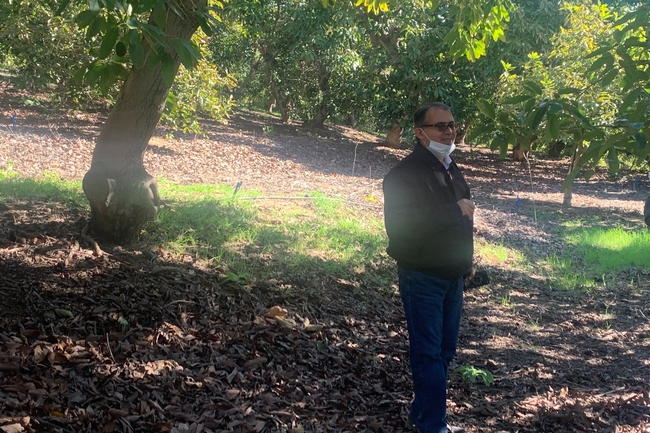Posts Tagged: Riverside County
Avocado growers to get irrigation tools, strategies from UC ANR’s Montazar
CDFA grant supports research to optimize water use for iconic California crop
California growers, who account for more than 90% of avocado production in the U.S., will soon be getting some help in weathering the extreme fluctuations of climate change.
Ali Montazar, a University of California Cooperative Extension irrigation and water management advisor, recently received a grant to develop tools and strategies that optimize growers' irrigation practices across Southern California – the state's avocado belt. California avocados are valued at more than $411 million, according to the National Agricultural Statistics Service.
“This region faces uncertain water supplies, mandatory reductions of water use, and the rising cost of water – while efficient use of irrigation water is one of the highest conservation priorities,” Montazar said. “Water is the most critically important input to avocado production.”

At the California Avocado Commission's suggestion, Orange County was added to the study to better capture the range of climates and cropping systems across the region, Montazar said.
He hopes to develop “crop coefficients” that avocado growers can use to determine the optimal irrigation for their crop based on a host of factors: soil type and salinity, canopy features, row orientation, slopes, soil and water management practices, and more.
“Growers are unclear on how much water the crop actually needs under those conditions,” Montazar said.
He will incorporate data from the actual water use in the experimental orchards – including information from the newest soil moisture and canopy temperature sensors – to help ensure growers do not under- or overwater their crops. Overirrigating contributes to a devastating disease, avocado root rot, caused by the plant pathogen Phytophthora cinnamomi.
Another component of the grant supports outreach in disseminating these resources and best practices to the broader agricultural community.
“Developing and adopting these tools and information may have a significant impact on water quality and quantity issues and bolster the economic sustainability of avocado production not only in the well-established production region of Southern California, but also in Kern and Tulare counties where new avocado plantings are growing,” Montazar said.
Preliminary findings and recommendations are expected at the end of 2022.
Riverside supervisors vote to restore UCCE funding
After more than 100 4-H members, UC Master Gardeners and others attended a Riverside Board of Supervisors' meeting in support of UC Cooperative Extension June 10, the panel voted 5-0 to restore UCCE's funding, reported Jeff Horseman and Matt Kristoffersen in the Riverside Press Enterprise.
The vote reversed an earlier decision to cut UCCE funding as part of a larger plan to deal with reduced county tax receipts. If the funding had not been restored, services including 4-H, nutrition education and agricultural programs would have been effected, said Eta Takele, UCCE director in Riverside County.
UC Cooperative Extension, a key part of UC Agriculture and Natural Resources, serves all California counties. Academic advisors work with farmers to implement more-efficient growing methods, solve pest management problems and develop smart water-use strategies. Natural resources advisors conduct wildfire education and research natural resources conservation. Nutrition educators promote nutritious eating habits and exercise for better health. California 4-H Youth Development Program engages youth to become leaders. Thousands of volunteers extend UCCE's through the Master Gardener, Master Food Preserver, California Naturalist, and the California 4-H Youth Development Programs.
During the June 10 meeting, the supervisors heard from Riverside 4-H members who have been aided by their involvement in the program.
4-H member Bethany Campbell told the supervisors 4-H helped her overcome shyness and gain confidence.
“4-H helped me rise above fear and insecurity to become a leader," Campbell said.
A Blythe 4-H member, Samantha Teater, 17, said, 4-H "definitely saved me from getting into trouble."
UC ANR associate vice president Wendy Powers attended the supervisors' meeting.
"Those who offered public comment provided heartfelt testimony about the impact of our programs and how they, personally, have benefited and how the county has benefited," Powers wrote in her blog. "The work's not over. We need to continue to engage those who don't know us but make decisions that impact us. We need to continue to engage those who do know us, and brainstorm how to do better – reach more people, have a greater impact."
The article said Riverside County officials would work with UC Cooperative Extension to save money by moving its offices from leased office space to county-owned space.

